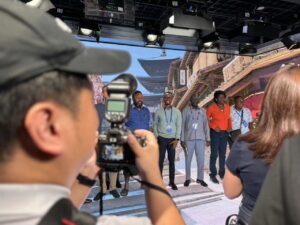By Mohammed AWAL, Beijing, China ([email protected])
In an era when media landscapes are continuously evolving, a transformative two-week seminar held in Beijing has brought together senior media professionals from Belt and Road Initiative countries to chart new courses for traditional media development and enhance international cooperation. This seminar, organised by the Research and Training Institute of National Radio and Television Administration of the People’s Republic of China (PRC) and sponsored by the Ministry of Commerce of the PRC, has set a benchmark for fostering global media collaboration.
The event saw participation from 29 senior management personnel representing mainstream media outlets from Bulgaria, Cyprus, Cuba, Ethiopia, Fiji, Ghana, Grenada, Iraq, Malaysia, Nigeria, South Sudan and Zambia, along with a representative from the African Union Commission. The diverse group engaged in an array of discussions and activities designed to explore the future of media in the digital age.

Pioneering media discussions
Participants delved into pertinent topics that are shaping the future of media worldwide. Sessions included ‘China’s Radio and Television Development and International Cooperation’; ‘Chinese Radio and Television Networks and 5G Communication’; ‘Media Technology Innovation’ and ‘Media and Information Literacy in the Internet Age’. These discussions not only highlighted China’s advancements in media technology but also provided a platform for exchanging ideas on global media trends.
A significant focus was placed on the role of 5G communication in transforming media networks. Participants explored how new technologies could enhance content delivery and audience engagement. Moreover, the importance of media and information literacy in combatting misinformation and ensuring the dissemination of accurate news was a key theme throughout the seminar.
Immersive experiences in China
The seminar was not confined to conference rooms. Attendees visited prominent media houses in Beijing and Fujian Province including CCTV.com, Fujian Media Group, Fujian Daily and Fujian Radio and Television Station. These visits offered a behind-the-scenes look at the operations and innovations driving Chinese media. The participants also toured the Media Convergence Centre in Xiapu County, gaining insights into how media convergence is being implemented at the county level.
Cultural immersion played a crucial role in the seminar, with visits to tourist and cultural centres in Beijing and Fujian Province. These excursions allowed participants to experience the rich cultural heritage and daily lives of the Chinese people, fostering a deeper understanding and appreciation of China’s societal context.
Collaborative reflections and future aspirations
A highlight of the seminar was an exchange of experiences among participants regarding media management and development in their respective countries. This dialogue shed light on common challenges faced by the media industry globally; such as the rise of fake news, the need for technological innovation and the importance of timely and accurate news dissemination.
During the closing session, Mr. Meng Jichang, President of the Research and Training Institute of National Radio and Television Administration of the PRC, expressed his hope for future collaborations. “Our audience now receives information through various channels, making it our responsibility to curate necessary and accurate information. We face common challenges such as preventing the spread of fake news and promoting technological advancements in the media field,” Mr. Jichang stated.
He emphasised the importance of uniting media efforts across countries to build a prosperous and informed global community. “I hope that we can all tell good stories, make the voices of the people heard and build mutual trust. Together, we can contribute to building a community with a shared future for all mankind,” he added.

A platform for optimism and unity
Mr. Ian Marshall, Ambassador Extraordinary and Plenipotentiary of the Embassy of Grenada in China, lauded the seminar as a unique platform for fostering collaboration and enhancing collective understanding of the dynamic media field. “The media has the power to bridge gaps, build consensus and highlight shared aspirations among different nations,” Mr. Marshall noted, underscoring the pivotal role of media in shaping public opinion and driving social change.
Participants left the seminar with a renewed sense of optimism about the future of media collaboration between their countries and China. The shared experiences and insights gained during the seminar have laid a foundation for a more interconnected and cooperative global media landscape.
Looking ahead
As the seminar concludes, participating media professionals return to their home countries equipped with new knowledge and a strengthened commitment to advancing their media sectors. The connections made and lessons learned in Beijing promise to foster ongoing international cooperation, contributing to the development of a more inclusive and informed global media community.
This seminar has not only highlighted the transformative potential of media technology but also underscored the importance of cultural exchange and mutual understanding in building a collaborative future. The participants’ shared vision and enthusiasm signal a bright future for international media cooperation, setting the stage for ongoing dialogue and innovation in the ever-evolving world of media.










